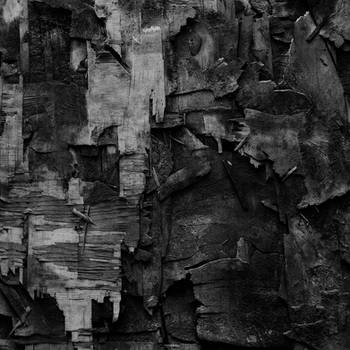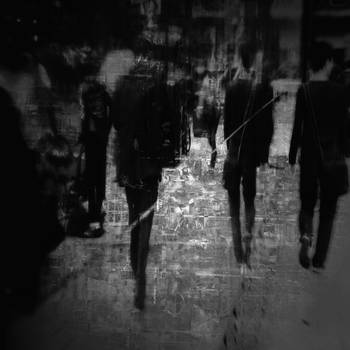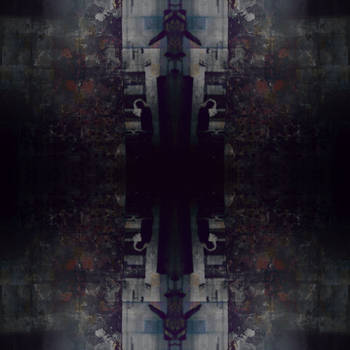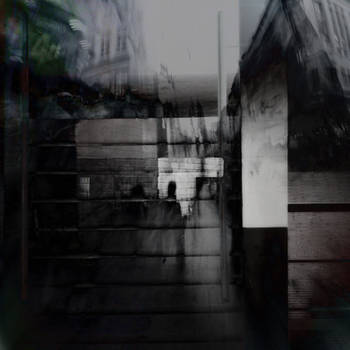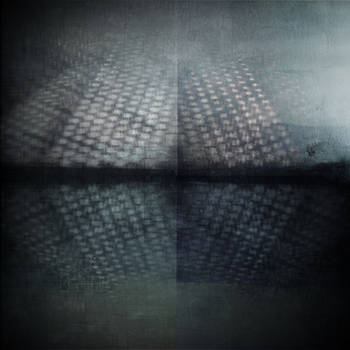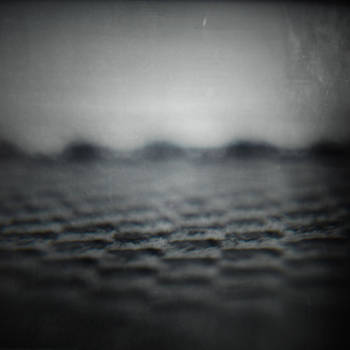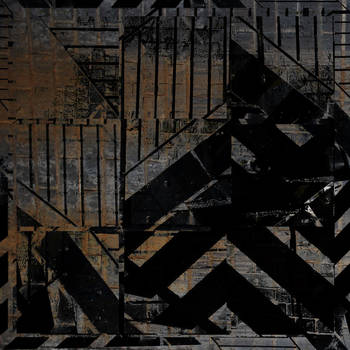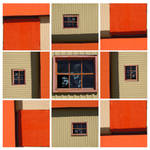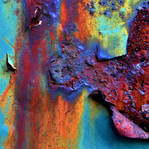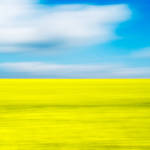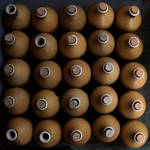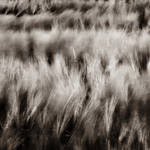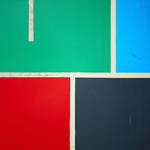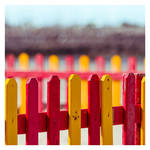> Please introduce yourself, in your own words. What are your interests?
If I must use my own words, rather than those from one of our shared languages, I will say a few words using the binary alphabet:
Aaaaa aaa aaa aaa aaaaa
So there we have a minimalist alphabet; a primitive language, but not without a degree of expressive quality. Now for something more abstract. Using '+' for the space and an underscore as the single letter:
_____+___+___+___+_____
Something abstract in my very own words. Does it say anything about me? Attempting something more surreal (if not dada), I will repeat your original question leaving the vowels but replacing the consonants with question marks: abstracting the vowels from the words, a form of inverted text speak, is very hard to understand:
??ea?e i???o?u?e ?ou??e??, i? ?ou? o?? ?o???. ??a? a?e ?ou? i??e?e??? (?)
Anyway, I am not interested in talking about myself. I'm not good at defining myself; My CV is a blank page, but that doesn't mean that I have done nothing with my life. I prefer to let myself be unpredictable and talk about my thoughts.
> Where did you begin with artistic endeavours? How did you come across Abstraction or Surrealism?
We are alive before we are born, we hear and feel long before we can see or even breathe. Our creative endeavours begin there, I don't remember them consciously.
When I was a teenager, I was short sighted but refused to wear glasses. I had to become interested in the things which were close-by because everything in the distance was a blur. I had to look at the distance in a particular way because trying to focus would strain my eyes, give me headaches and make me tired. I had to learn to look at the distance in a different way, to see without looking. At that age thinking was my distant observation. As an artist I always liked the blank canvas and never wanted to spoil it. I actually own more blank canvasses than I have ever painted on; I also own several boxes of unused acrylic, oil and watercolour paints.
Abstraction is everywhere. It is impossible to separate art from life and also impossible to use more than just a small part of what we see. Our senses and our memories are tools of abstraction. When thinking about creative abstraction, what springs to mind for some reason are the villages of North Devon - just a place I went to once on holiday. People had painted their cottages in different hues; bright colours, each cottage having its own blend of complimentary shades, some conservative, others more vibrant and striking. But what really interested me was how one cottage might clash with its neighbour, or really stand out. I remember the colours of those cottages, even if I don't remember the shape or many of the finer details: my mind has abstracted certain elements from the scene. This kind of abstraction with colour is really important to me in art. Without changing the shape of a thing, colour can give life to the otherwise mundane. So there is abstraction in almost random things and in the chaos of how people impose themselves on their environment as individuals. We might say that this is not really art, but I would say it is fundamental and features as a strong theme for many artists of the modern era. Painters take photographs of their paintings and submit them to the ‘paintings’ gallery, not the photography gallery. If a photographer takes a photograph of a brightly painted cottage there is no consideration for the painter who painted it. Surely the painter is an abstract artist and the cottage is the canvas.
I am still trying to get my head around surrealism. Or maybe i refuse to. How can I add structure to my unconscious? I think there is surrealism in my view of abstract things: perhaps abstract art invokes the surreal in us. If we look at something which does not represent anything, then if we see anything in it then it must come from the unconscious mind. I have often thought that looking at abstract art is like looking at ink blots in an association test: we are revealing unknown things about ourselves. It is more about what we see, than what we create. To me, surrealism is a very misunderstood area. I can't say that I understand it, but then in the world today, with so much entertainment technology, people don't give time and thought to their dreams, their own consciousness or what might be described as the psychology of the soul. But then again, the visionary, mystical type of person who is attuned to the depths of the psyche has always been rare amongst us. This is why so few are really effective in creating surreal art.
In my own art I have always related surrealism with that which reminds me of my own dreams. The fact that others may not see the surrealism in it does not concern me as they have no conception of the nature of my dreams. For me, the few pieces which I have categorised as surreal simply serve as a reminder to elements of dreams that I have had. I find that dreams are too easily forgotten. Vivid at the time but too fast to slip away, like water or sand though our fingers. In relation, I find the abundance of both sand and liquidity intriguing in the works of Dali.
The liquidity of time and how it slips though our fingers like sand might be a major concern for us, if we ever gave it time in our thoughts. But then that depends on whether we believe we are here for some purpose or just here passing (wasting) time. Maybe our heads are full of sand and we are actually blocked up egg timers. Using the imagery of Dali again, we and everything we build seems strangely out of place against the natural background, nature it seems can't wait to turn us into sand. Perhaps entropy is the gradual process of abstraction towards minimalism, certainly nature will reduces us and everything we do to dust and then blow it away.
> How would you explain the concept of Abstraction or Surrealism to someone with no experience with the genre?
There is no one who is without experience of abstraction or surrealism. Text speak, for example, is a form of abstraction, lvng out crtn lttrs bt cn stll rd mssg. We can do the same thing with images, the more unrecognisable the object becomes the more complete the abstraction is. We can change objects or words to make them slightly odd or illogical or irrational - “absolately funderful” - but there is a mass assumption that we do not (really) mean to be abstract or surreal in what we do. Using manual settings on your camera is a similar thing, we can make it do things that it is not designed to do.
The world is an abstract and surreal place. Television does not show the real world. Propaganda is an abstraction of the truth. Politics is both abstract and surreal because so many political leaders have never lived in the real world. The internet is a different place to the real world, people can act out their fantasies there. Interactive games and roleplay. All of these virtual realities are spawned from our imagination, they have become everyday things, evolving daily and they are closer to surrealism than reality.
An unfinished artwork is abstract because it is incomplete. I find beauty in unfinished things and sometimes find the finished article disappointing. It is like the beauty of blossom on trees which never seem to bear any fruit. Or the rotten fruit which has over ripened and fallen to the floor. Similarly, abstract art is supposed not to represent real world things and yet a bar chart or a pie chart is abstract if we don’t know what the shapes represent.
Perhaps first we should be clear about reality. What is reality? It is impossible to prove that reality exists. This could all be a dream. Reality is an idea, a concept; only a part of everything that we can experience. Realists like to think that reality is everything and everything else is just illusion. Perhaps realists are prepared to accept the harshness and the unfairness of life. People often say when experiencing something good: “pinch me, in case I am dreaming”. But if dreams can be good and bad, surely reality can be good and bad too? Reality seems to have become mostly about individuals striving to improve things for themselves rather than striving to make a better world for all. Hence one man’s dream is another’s nightmare.
This kind of realisation is what spawned surrealism (dada) in a reaction against the mindset during the first world war. Surrealism is perhaps seen as an escape from reality, but it was designed as a revolution to change reality. The desire for more self awareness versus the desire for more power and wealth. Discovery of the inner world versus exploitation of the outer world. The age old battle between enlightenment and the burden of pure greed. Surrealism is the psychologist of the world, trying to relieve humanity of its neurosis. But of course humanity is sceptical, saying that it is nonsense, it makes no sense.
You can not change the world, you can only change yourself. We should value our own art over the art of others because it helps us realise what we are and helps us to value ourselves. People who don't value themselves are always seeking to find value elsewhere; they are never satisfied because self-value is the only way to achieve satisfaction.
> What inspires you to use Abstraction or Surrealism in your work?
Photographers know exactly what they want to achieve, they apply the technique and get the result. I have no interest in doing that. I would rather wander around blindfolded clicking at random and then look to see what the results are. I always keep every image. The creative process is not in capturing an image, but in seeing what unexpected qualities an image may have. Similarly in processing images, I like to be very spontaneous and random, without any idea or planned outcome. Then just keep experimenting until something interesting happens. I also may use an automated series of processes on many images and see what happens. It is about discovering the unexpected. So I don't express myself, I just look for things that I never could have imagined.
> What do you want to express with your artwork? What is the idea you're trying to put across?
For me, often there is nothing to express, so I just experiment and then see what the results bring out of me. Observing what comes out is everything, and is really exciting. At my most creative I have no idea what I am doing - barely involved; observing. There is never a plan, just a stream of unconscious events.
> What are your 'tools of the trade'? How do you create your art?
How can I call myself a photographer and not talk about my camera? My camera can speak for itself, it says I am not a photographer and my camera never lies. If I am on the street with a camera, people will look at me and I can tell that they are thinking “what the hell is that idiot doing?” - I might spend some time photographing the same blank wall, over and again. Sometimes people stop politely so that I can take my photo, but I have to let them pass otherwise they might wait for ages. People often will stop to see what I am photographing - they glance in the direction that my camera is pointing, see nothing, then look at me, drawing their eyebrows closer together in that disapprovingly bemused way. I love that. Imagination means seeing things that others can't see, art involves sharing your imagination with others.
> Do you think the quality of a piece depends more upon technical perfection, or the message contained therein?
The difference is like that of a magician and a musician. The magician performs magic in the form of illusion. The technique is so well hidden that we are left wondering how it could possibly have been done. But we are moved by the musician in a very different way. In a variety of possible ways; perhaps we dance, lost in the rhythm of our own movements, or we may just listen eyes closed. Most interestingly we may listen to the music in a variety of different settings: in the car, at a party, in the background while we do other things. We may sing along or move in time to the sound. Music becomes part of our everyday environment whereas stage illusion doesn't.
Music is like the weather, sunshine or rain. We forget about how they are made whilst they happen, we just experience the way in which they impact on our moods. Magic is an illusion; the act of the mind tricking the senses, while music is a sensory experience like food, drink, warmth, it also invokes powerful emotions. The magician can not make music in the same way that the musician can make magic. People are no longer interested in the magic of the magician when they know how the trick is done. But even though they may know exactly how the musician does what they do, they can't do it in exactly the same way.
Why are there so many more musicians than magicians?
> Who are your favourite visual artists, and why?
Ben Wilson is my favourite artist, most well-known for painting tiny compositions upon discarded chewing gum in the street. What I love about Ben is that he is doing something creative without trying to say anything, or to sell anything. His art is a local thing, not a global thing. The question that observers might ask is why? and I believe the answer to that is simply to make people happy. I like that.
> Which dA Groups would you recommend to someone looking to get involved with abstract and surreal art?
My favourite groups are kaleidoscopism, Photograph-ism, WhoNeedsColour, IndustrialArt and Abstract-and-Surreal. But I really take little interest in groups at all. I never submit to them. I am lucky that a few groups request my art in their galleries. However, I don't think that people should submit their work to galleries, it is inappropriate. It is like walking into a national art gallery and hanging your art on the wall. Galleries need to be very selective in what they show otherwise everything is diluted; lost. I wish deviantART had a system whereby only gallery directors decided what was shown in galleries. That way we would get a much greater artistic experience on deviantART. And there would be a motivation to produce better art rather than the anything-goes-anywhere approach. This would not change the fact that individuals would have their own gallery where they could hang whatever they wanted.
> What advice would you give to an absolute beginner in the genre?
Start! So... where to begin?
Photograph the colour, not the shape of things.
Photograph an object so that no-one would recognise what it is, be clear from that moment that it has become something else.
Think of the camera not as a tool to capture something as it is, but realise that the world through the lens is different place.
Look for Rothko-landscapes in the texture of things; on painted surfaces or the textures of urban decay.
Rather than try to get an object in perfect focus, absorb the nature of it in a blur as if that were its essence.
Understand that the background is more important than the subject, because it makes the subject stand out.
Because the background is more important than the subject it is fine to lose the subject within it.
Treat objects as if they were part of a collage.
Photograph numbers and make a photo-alphabet, and photograph lines like Mondrian might create.
Learn to see shapes in textures.
Break the rule of keeping your camera still, and break all the other rules too.
Remember that the worst photographers take some of the most interesting photographs.
Look at your images, sometimes your worst photos are your best ones.
Experiment!
Use mistakes creatively.
Just believe that you are great and you will see great things in what you do.
Be aware that there are unknown creative processes working through you.
Take lots of photographs.
Take random photographs with your eyes shut
Trick you camera into doing things was not supposed to do.
Find your own way.
If you continue to do things wrongly you can become very good at doing them wrong.
Individuality means inventing your own techniques.
Sometimes you can make a good image out of two bad ones: two wrongs can make a right.
Listen to the advice of experts, then do the opposite.
Any object that lets light through is a filter.
Damaged and faulty equipment can produce interesting results.
Don't be ashamed to be unprofessional. You can be extremely unprofessional and still have people wanting to buy your art.
Shadows and silhouettes are better than madcows and cigarettes.
Reflections are like double exposures.
Light plays trick on you, you can play tricks on it too.., it's all a game.
> Any final words on abstract and surreal art?
One of the great things about abstract art is that there is no right or wrong; people can only say whether they like it or not, or perhaps that they don't get it. Some may say that anyone can do it - "my 2-year-old can do better" - but then some of those people are the kind that will ask you questions that they know the answer to so that they can prove that they are smarter than you. They want to be better than a 2-year-old child without realising how much better the 2-year-old is than them: uncontaminated.
Language has become very good at defining things that we understand and explaining them to others, but what do we do when it comes to explaining things that we don't understand? There are emotions that we feel, but we don't know why. How can we express them creatively?
No-one can tell you what to look for in abstract art: looking at abstract art is like looking inside your own soul. Some people look at abstract art and see nothing because they never search their soul for anything. They simply do what they are told and no-one can tell you what to look for in abstract art. Abstract art is the great leveller: no one can tell you what to see or what it means. Abstract art is the end for the dictator.
People want to change the world but not change themselves.
Science is a strange thing. We have an understanding of the nature of everything, but we have very little understanding of each other. It is almost as though we can't stand being with other people so much that we would rather count all the atoms in the universe. Science is based on numbers because nature is based on numbers too, although nature always gets better results from them. This is probably because nature is not obsessed with understanding or perfection; just balance.
Part of the nature of our senses means that we will see nothing until we are aware of its relevance: the search for the unknown is something we do with our eyes closed. We can close our eyes, but not our ears. There is profound importance in listening. Perhaps only in complete silence do we ever hear the truth
Finally, I realise that my answers had become disorganised and unstructured: reading through I realised that I had jumped from one point to another and that some of the answers had landed under the wrong question. I am pleased that there is a degree of surreality - after all, this is largely a stream of unconscious thoughts. Surrealism is not concise and organised.
I have learned a lot from this.
> In conclusion, pick nine works from your Favourites that you particularly enjoy.
